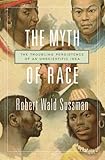The Myth of Race : The Troubling Persistence of an Unscientific Idea / Robert Wald Sussman.
Material type: TextPublisher: Cambridge, MA : Harvard University Press, [2014]Copyright date: ©2014Description: 1 online resource (346 p.) : 4 halftones, 2 line illustrationsContent type:
TextPublisher: Cambridge, MA : Harvard University Press, [2014]Copyright date: ©2014Description: 1 online resource (346 p.) : 4 halftones, 2 line illustrationsContent type: - 9780674417311
- 9780674736160
- 305.8 23
- online - DeGruyter
- Issued also in print.
| Item type | Current library | Call number | URL | Status | Notes | Barcode | |
|---|---|---|---|---|---|---|---|
 eBook
eBook
|
Biblioteca "Angelicum" Pont. Univ. S.Tommaso d'Aquino Nuvola online | online - DeGruyter (Browse shelf(Opens below)) | Online access | Not for loan (Accesso limitato) | Accesso per gli utenti autorizzati / Access for authorized users | (dgr)9780674736160 |
Browsing Biblioteca "Angelicum" Pont. Univ. S.Tommaso d'Aquino shelves, Shelving location: Nuvola online Close shelf browser (Hides shelf browser)

|

|

|

|

|

|

|
||
| online - DeGruyter World Philology / | online - DeGruyter Stuff and Money in the Time of the French Revolution / | online - DeGruyter Philosophy's Artful Conversation / | online - DeGruyter The Myth of Race : The Troubling Persistence of an Unscientific Idea / | online - DeGruyter Racial Reckoning : Prosecuting America’s Civil Rights Murders / | online - DeGruyter American Apocalypse : A History of Modern Evangelicalism / | online - DeGruyter The Force of Law / |
Frontmatter -- Contents -- List of Abbreviations -- Introduction -- 1. Early Racism in Western Europe -- 2. The Birth of Eugenics -- 3. The Merging of Polygenics and Eugenics -- 4. Eugenics and the Nazis -- 5. The Antidote: Boas and the Anthropological Concept of Culture -- 6. Physical Anthropology in the Early Twentieth Century -- 7. The Downfall of Eugenics -- 8. The Beginnings of Modern Scientific Racism -- 9. The Pioneer Fund, 1970s-1990s -- 10. The Pioneer Fund in the Twenty- First Century -- 11. Modern Racism and Anti- Immigration Policies -- Conclusion -- Appendix A: The Eugenics Movement, 1890s- 1940s -- Appendix B: The Pioneer Fund -- References -- Acknowledgments -- Index
restricted access online access with authorization star
http://purl.org/coar/access_right/c_16ec
Biological races do not exist-and never have. This view is shared by all scientists who study variation in human populations. Yet racial prejudice and intolerance based on the myth of race remain deeply ingrained in Western society. In his powerful examination of a persistent, false, and poisonous idea, Robert Sussman explores how race emerged as a social construct from early biblical justifications to the pseudoscientific studies of today. The Myth of Race traces the origins of modern racist ideology to the Spanish Inquisition, revealing how sixteenth-century theories of racial degeneration became a crucial justification for Western imperialism and slavery. In the nineteenth century, these theories fused with Darwinism to produce the highly influential and pernicious eugenics movement. Believing that traits from cranial shape to raw intelligence were immutable, eugenicists developed hierarchies that classified certain races, especially fair-skinned "Aryans," as superior to others. These ideologues proposed programs of intelligence testing, selective breeding, and human sterilization-policies that fed straight into Nazi genocide. Sussman examines how opponents of eugenics, guided by the German-American anthropologist Franz Boas's new, scientifically supported concept of culture, exposed fallacies in racist thinking. Although eugenics is now widely discredited, some groups and individuals today claim a new scientific basis for old racist assumptions. Pondering the continuing influence of racist research and thought, despite all evidence to the contrary, Sussman explains why-when it comes to race-too many people still mistake bigotry for science.
Issued also in print.
Mode of access: Internet via World Wide Web.
In English.
Description based on online resource; title from PDF title page (publisher's Web site, viewed 30. Aug 2021)


